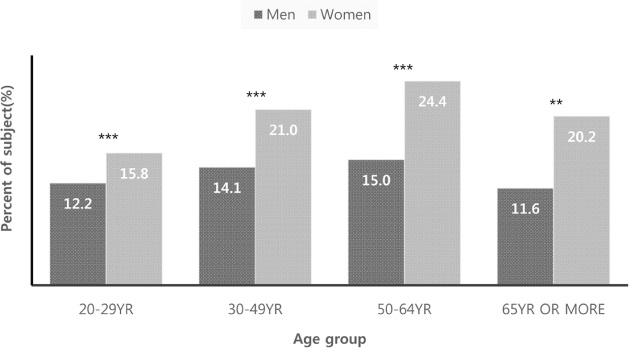Korean J Community Nutr.
2017 Aug;22(4):347-355. 10.5720/kjcn.2017.22.4.347.
Use of Dietary Supplements and Determinants of Taking Dietary Supplements by Gender in the Korean Population: Using the 4(th) Korean National Health and Nutrition Examination Survey (2007-2009)
- Affiliations
-
- 1Department of Food and Nutrition, Seoul National University, Seoul, Korea.
- 2Major of Food and Nutrition, The Catholic University of Korea, Bucheon, Korea. yjsong@catholic.ac.kr
- KMID: 2389570
- DOI: http://doi.org/10.5720/kjcn.2017.22.4.347
Abstract
OBJECTIVES
Although dietary supplements use in Korea has been rapidly increasing and women are more likely to take dietary supplements more than men, only a few studies have been conducted to investigate factors contributing to gender differences in dietary supplement use in the Korean population. The aim of this study is to evaluate the prevalence of dietary supplement use and also identify gender-specific key factors that contribute to it using the data of the 4th KNHANES.
METHODS
Subjects were divided into user and non-user groups according to the answer given to the question that asked whether they had used any dietary supplement for more than 2 weeks on a regular basis during the previous year. Factors related to dietary supplement use were examined by general characteristics, health behavior and eating behavior.
RESULTS
Prevalence of dietary supplement use was 13.6% for men and 20.6% for women. Users were more likely to be middle-aged, have higher income and education, have a spouse, or reside in dong areas in both men and women. Regarding health behaviors, men with desirable lifestyle behavior were more likely to take dietary supplements, while men who smoked were less likely to take dietary supplements. Regarding disease history, both men and women with a current disease had higher odds of taking supplements. With regard to dietary behavior, frequent eating out and nutrition attitude were associated with higher odds of taking supplements in both men and in women.
CONCLUSIONS
Health or dietary behavior related factors that were associated with taking supplements differed by gender. These findings can be useful for planning gender-specific dietary education and health programs.
MeSH Terms
Figure
Reference
-
1. Ministry of Food and Drug Safety. Statistic report of Health Functional Food. 2014. updated 2014 Aug 06. cited 2017 May 15. Available from: http://www.mfds.go.kr/index.do?mid=675&seq=24741.2. Lee YO, Song YJ. Sociodemographic characteristics, lifestyle factors, and nutrient intake by taking vitamin/mineral supplements. J Korean Soc Diet Cult. 2010; 25(4):480–486.3. Kim SH, Han JH, Kim WY. Health functional food use and related variables among the middle-aged in Korea. J Nutr Health. 2010; 43(3):294–303.4. Radimer K, Bindewald B, Hughes J, Ervin B, Swanson C, Picciano MF. Dietary supplement use by US adults: data from the National Health and Nutrition Examination Survey, 1999-2000. Am J Epidemiol. 2004; 160(4):339–349.5. Bailey RL, Gahche JJ, Miller PE, Thomas PR, Dwyer JT. Why US adults use dietary supplements. JAMA. 2013; 173(5):355–361.6. Bailey RL, Fulgoni VL, Keast DR, Dwyer JT. Dietary supplement use is associated with higher intakes of minerals from food sources. Am J Clin Nutr. 2011; 94(5):1376–1381.7. Bailey RL, Fulgoni VL, Keast DR, Dwyer JT. Examination of vitamin intakes among US adults by dietary supplement use. J Acad Nutr Diet. 2012; 112(5):657–663.8. Reinert A, Rohrmann S, Becker N, Linseisen J. Lifestyle and diet in people using dietary supplements: A German cohort study. Eur J Nutr. 2007; 46(3):165–173.9. McNaughton SA, Mishra GD, Paul AA, Prynne CJ, Wadsworth MEJ. Supplement use is associated with health status and health-related behaviors in the 1946 British birth cohort. J Nutr. 2005; 135(7):1782–1789.10. Giammarioli S, Boniglia C, Carratu B, Ciarrocchi M, Chiarotti F, Mosca M. Use of food supplements and determinants of usage in a sample Italian adult population. Public Health Nutr. 2013; 16(10):1768–1781.11. Dickinson A, MacKay D. Health habits and other characteristics of dietary supplement users: a review. Nutr J. 2014; 13(1):14.12. Satia-Abouta J, Kristal AR, Patterson RE, Littman AJ, Stratton KL, White E. Dietary supplement use and medical conditions: The VITAL study. Am J Prev Med. 2003; 24(1):43–51.13. Story M, Kaphingst KM, Robinson-O'Brien R, Glanz K. Creating healthy food and eating environments: Policy and environmental approaches. Annu Rev Public Health. 2008; 29(1):253–272.14. Lentjes MA, Welch AA, Keogh RH, Luben RN, Khaw KT. Opposites don't attract: high spouse concordance for dietary supplement use in the European Prospective Investigation into Cancer in Norfolk (EPIC-Norfolk) cohort study. Public Health Nutr. 2015; 18(6):1060–1066.15. Ishihara J, Sobue T, Yamamoto S, Sasaki S, Tsugane S. Demographics, lifestyles, health characteristics, and dietary intake among dietary supplement users in Japan. Int J Epidemiol. 2003; 32(4):546–553.16. Pouchieu C, Andreeva VA, Peneau S, Kesse-Guyot E, Lassale C, Hercberg S. Sociodemographic, lifestyle and dietary correlates of dietary supplement use in a large sample of French adults: results from the NutriNet-Sante cohort study. Br J Nutr. 2013; 110(8):1480–1491.
- Full Text Links
- Actions
-
Cited
- CITED
-
- Close
- Share
- Similar articles
-
- What Types of Dietary Supplements Are Used in Korea? Data from the Korean National Health and Nutritional Examination Survey 2005
- Nutritional Status of Korean Toddlers: From the Korean National Health and Nutrition Examination Survey 2007~2009
- Dietary supplement use and its related factors among Chinese international and Korean college students in South Korea
- The Association between Taking Dietary Supplements and Healthy Habits among Korean Adults: Results from the Fifth Korea National Health and Nutritional Examination Survey (2010-2012)
- Top 10 Dietary Supplements of Korean Adults from the 4th Korea National Health and Nutrition Examination Survey


